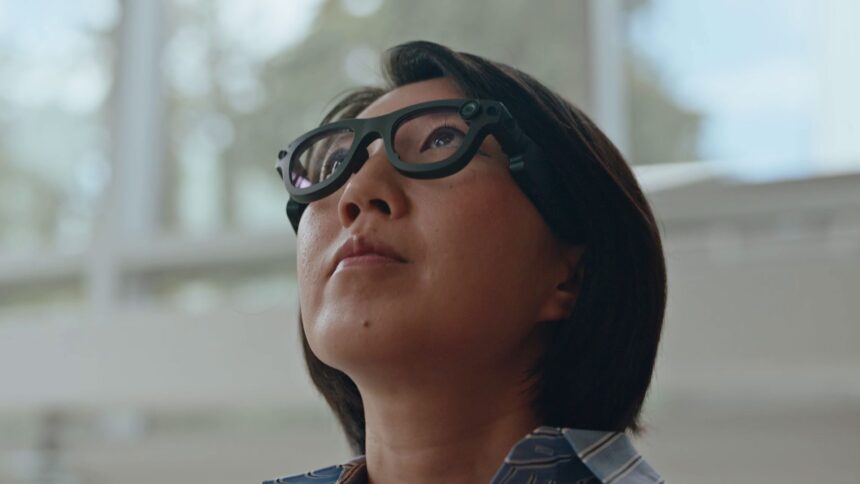Meta introduced it’s delivery out Venture Aria Gen 2 to third-party researchers subsequent yr, which the corporate hopes will speed up growth of machine notion and AI applied sciences wanted for future AR glasses and private AI assistants.
The Information
Meta debuted Venture Aria Gen 1 again in 2020, the corporate’s sensor-packed analysis glasses which it used internally to coach numerous AR-focused notion techniques, along with releasing it in 2024 to third-party researchers throughout 300 labs in 27 international locations.
Then, in February, the corporate introduced Aria Gen 2, which Meta says contains enhancements in sensing, consolation, interactivity, and on-device computation. Notably, neither era incorporates a show of any sort, like the corporate’s lately launch Meta Ray-Ban Show sensible glasses.
Now the corporate is taking functions for researchers wanting to make use of the gadget, which is alleged to ship to certified candidates someday in Q2 2026. That additionally means functions for Aria Gen 1 at the moment are closed, with remaining requests nonetheless to be processed.
To entrance run what Meta calls a “broad” rollout subsequent yr, the corporate is releasing two main assets: the Aria Gen 2 System Whitepaper and the Aria Gen 2 Pilot Dataset.
The whitepaper particulars the gadget’s ergonomic design, expanded sensor suite, Meta’s customized low-power co-processor for real-time notion, and compares Gen 1 and Gen 2’s talents.
In the meantime, the pilot dataset offers examples of information captured by Aria Gen 2, exhibiting its capabilities in hand and eye-tracking, sensor fusion, and environmental mapping. The dataset additionally contains instance outputs from Meta’s personal algorithms, reminiscent of hand-object interplay and 3D bounding field detection, in addition to NVIDIA’s FoundationStereo for depth estimation.
Meta is accepting functions from each tutorial and company researchers for Aria Gen 2.
My Take
Meta doesn’t name Venture Aria ‘AI glasses’ prefer it does with its numerous generations of Ray-Ban Meta or Meta Ray-Ban Show, and even ‘sensible glasses’ such as you may anticipate—even when they’re substantively related on the face of issues. They’re squarely thought of ‘analysis glasses’ by the corporate.
Cool, however why? Why does the corporate that already makes sensible glasses with and with out shows, and funky prototype AR glasses have to put out what’s substantively the skeleton of a future gadget?
What Meta is making an attempt to do with Venture Aria is definitely fairly sensible for a number of causes: positive, it’s placing out a framework that analysis groups will construct on, however it’s additionally doing it at a relatively decrease value than outright hiring groups to instantly construct out future use circumstances, no matter these may be.
Whereas the corporate characterizes its future Aria Gen 2 rollout as “broad”, Meta remains to be filtering for tasks based mostly on benefit, i.e. getting an opportunity to information analysis with out actually having to interface with what is going to seemingly be considerably greater than 300 groups, all of whom will use the glasses to unravel issues in how people can extra fluidly work together with an AI system that may see, hear, and know a heck of much more about your environment than you may at any given second.
AI can be rising quicker than provide chains can sustain, which I believe greater than necessitates an artisanal pair of sensible glasses so groups can become familiar with what is going to drive the way forward for AR glasses—the actual crux of Meta’s subsequent massive transfer.
Constructing out an AR platform which will in the future supplant the smartphone is not any small process, and its iterative steps have the potential to present Meta the form of market share the corporate dreamt of method again in 2013 when it co-released the HTC First, which on the time was colloquially known as the ‘Fb cellphone’.
The gadget was a flop, partly as a result of the {hardware} was lackluster, and I believe I’m not alone in saying so, largely as a result of individuals didn’t desire a Fb cellphone of their pockets at any value when the ecosystem had some many different (clearly higher) selections.
Wanting again on the early smartphones, Apple teaches us that you simply don’t should be first to be finest, however it does assist to have so many patents and underlying analysis tasks that your place out there is usually assured. And Meta has that in spades.











